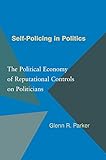Self-Policing in Politics : The Political Economy of Reputational Controls on Politicians / Glenn R. Parker.
Material type: TextPublisher: Princeton, NJ : Princeton University Press, [2022]Copyright date: ©2004Description: 1 online resource (194 p.) : 4 line illus. 35 tablesContent type:
TextPublisher: Princeton, NJ : Princeton University Press, [2022]Copyright date: ©2004Description: 1 online resource (194 p.) : 4 line illus. 35 tablesContent type: - 9780691225432
- Legislators -- United States
- Political corruption -- Economic aspects
- Political ethics -- Economic aspects
- Self-control -- Economic aspects
- POLITICAL SCIENCE / American Government / General
- Agrawal, Anup
- Akerlof, George H
- Beard, Edmund
- Bianco, William T
- Cain, Bruce
- Coase, Ronald H
- Davis, Michael
- Downs, Anthony
- Ferejohn, John
- Fiorina, Morris
- Goff, Brian
- Horn, Stephen
- Ippolito, Pauline M
- Klein, Benjamin
- Krehbiel, Keith
- Maloney, Michael
- Ornstein, Norman J
- Peltzman, Sam
- Saloma, John S
- Teeters, Holly
- Van Houweling, Robert
- Vanbeek, James R
- Ward, Daniel S
- Welch, Susan
- Yiannakis, Diana Evans
- adverse selection
- assumptions: extended dealings
- congressional casework
- congressional foreign travel
- corruption
- elections: control of politicians
- extended dealings
- faithful-agent reputation: coding
- home style
- honoraria
- hypotheses
- incomplete contracts
- last-period problems: in Congress
- legislator-constituent contact
- moral hazards
- opportunism: check kiting
- post-elective employment: categories of
- price premium
- principal-agent relationship
- quasi-experimental research
- quasi-rents
- rational ignorance
- reputation: accessibility
- reputational control: evidence of
- residual claimant
- shirking: in Congress
- vertical integration
- 172/.2 21
- JA79
- JA79 .P353 2004
- online - DeGruyter
| Item type | Current library | Call number | URL | Status | Notes | Barcode | |
|---|---|---|---|---|---|---|---|
 eBook
eBook
|
Biblioteca "Angelicum" Pont. Univ. S.Tommaso d'Aquino Nuvola online | online - DeGruyter (Browse shelf(Opens below)) | Online access | Not for loan (Accesso limitato) | Accesso per gli utenti autorizzati / Access for authorized users | (dgr)9780691225432 |
Frontmatter -- Contents -- List of Figures and Tables -- Acknowledgments -- Introduction -- CHAPTER 1 What Is Opportunism and How Do We Control It? -- CHAPTER 2 How Reputations Control Cheating in Economics and Politics -- CHAPTER 3 Problems in the Market for Legislators -- CHAPTER 4 Hypotheses, Measurement, and Data -- CHAPTER 5 Constraining Opportunism through Self-Policing -- CHAPTER 6 Reputational Capital and Job Security; or, If Trustworthy Legislators Are at a Premium, Are They Paid One? -- CHAPTER 7 Weaknesses in Reputational Controls In -- Conclusion -- APPENDIX 1 Most Important Characteristic for Legislator to Possess: Examples of Category Content -- APPENDIX 2 Examples of Categories of Employment -- APPENDIX 3 Codes for Identifying Faithful Agents -- APPENDIX 4 Lifetime Judicial Appointments: 1965–1996 -- APPENDIX 5 Examples of Prestigious Post-Elective Employment Positions -- APPENDIX 6 Electoral Defeat and Post-Elective Employment for Senators in the Analysis -- Notes -- References -- Name Index -- Subject Index
restricted access online access with authorization star
http://purl.org/coar/access_right/c_16ec
Contrary to what news reports might suggest, the majority of politicians behave ethically and are never subject to investigations. Is this because of the elaborate system of rules Congress has constructed to regulate the conduct of its members as well as the fear of electoral reprisal? Drawing on economic literature on the behavior of firms, Glenn Parker answers no. He argues that members of Congress behave ethnically not because of the fear of punishment but because of their concern for their reputations. He draws parallels between politicians and businesses, since both stand to suffer significantly when accused of wrongdoing. Just as business' poor behavior can cause brand names to be tarnished, prices to plummet, and future business to disappear, dishonest politicians stand to sacrifice the human capital invested in their careers, and premiums for honesty, such as electoral security and prestigious post-elective employment. Parker explores public attitudes toward the behavior of members of Congress and shows how those attitudes shape the way members conduct their professional lives. Written from the perspective of public choice, this book offers a novel approach to the question of how to keep politicians honest.
Mode of access: Internet via World Wide Web.
In English.
Description based on online resource; title from PDF title page (publisher's Web site, viewed 29. Jul 2022)


